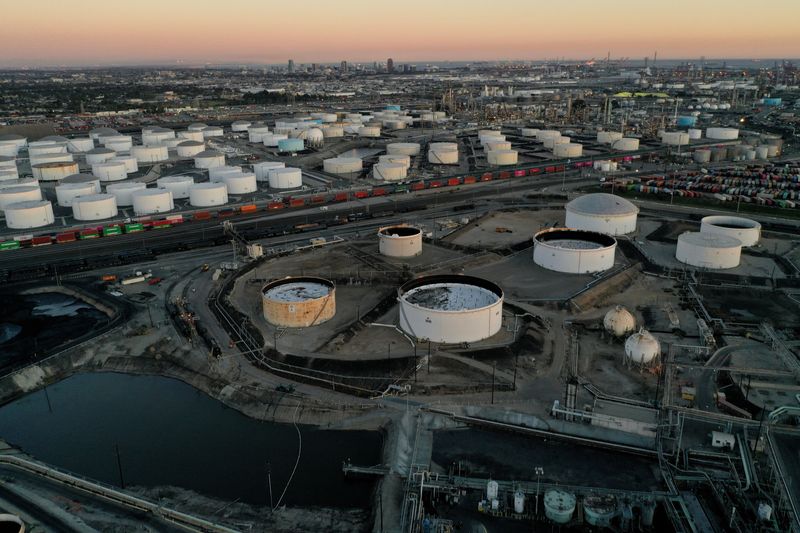By Georgina McCartney
HOUSTON (Reuters) -Oil prices settled lower on Wednesday after U.S. crude and gasoline stocks rose by more than expected last week, but losses were capped by worries about the intensifying war between major oil producer Russia and Ukraine.
Brent crude futures for January settled down 50 cents, or 0.68%, at $72.81. U.S. West Texas Intermediate crude futures for December expired on Wednesday, and settled down 52 cents, or 0.75%, at $68.87, while the more active WTI contract for January settled down 49 cents, or 0.71% at $68.75.
U.S. crude and gasoline stocks rose by more than expected last week, according to data from the Energy Information Administration, which weighed on prices.
Further boosting supply, Norway’s Equinor said it had restored full output capacity at the Johan Sverdrup oilfield in the North Sea following a power outage.
Weak demand in the world’s largest crude importer continued, with Chinese stimulus announcements failing to boost oil demand growth in the near-term, Macquarie energy strategists said in a note.
The conflict between Russia and Ukraine and concern around future oil supply disruptions helped keep a floor under prices.
“These risks to supply are definitely keeping the support here and offsetting to a degree concerns around the global demand outlook,” said John Kilduff, partner at Again Capital in New York.
Ukraine fired a volley of British Storm Shadow cruise missiles into Russia on Wednesday, the latest Western weapon it has been permitted to use on Russian targets a day after it fired U.S. ATACMS missiles.
This has put geopolitical risk back in the market, StoneX energy analyst Alex Hodes said in a note on Wednesday.
But long positions in WTI have declined significantly despite the added geopolitical risk, according to Aegis Hedging associate Christian Drolshagen, with hedge funds holding only 50% of summer levels, per CFTC data.
Elsewhere, the U.S. on Wednesday vetoed a U.N. Security Council resolution for a ceasefire in Gaza, buoying oil prices’ war risk premium on concerns around potential supply disruptions as war in the Middle East continues.
“The market is very nervous something could happen with another escalation between the Israelis and Iranians,” said Again Capital’s Kilduff.

“Everyone is focused on (U.S. President-elect Donald) Trump and U.S. producers being let loose, but the flip side of that is that sanctions are definitely back in the market as far as what happens next with Iranian supplies and its ability to export,” he added.
Global supply could be further squeezed, with OPEC+ potentially set to push back output increases again when it meets on Dec. 1 due to weak global oil demand, according to three OPEC+ sources familiar with the discussions.






